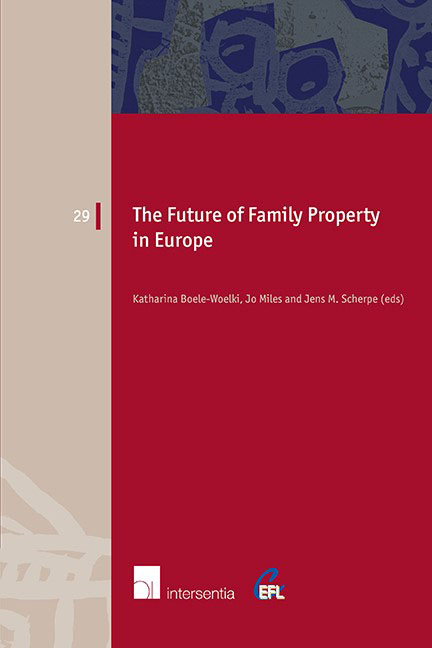Book contents
- Frontmatter
- Preface
- Contents
- List of authors
- PART ONE KEYNOTE LECTURE
- PART TWO MATRIMONIAL PROPERTY LAW IN EU ROPE
- PART THREE FAMILY CONTRACTS – ISSUES OF AUTONOMY
- PART FOUR PROTECTION OF OLDER PEOPLE IN LAW
- PART FIVE FREEDOM OF TESTATION AND PROTECTION OF FAMILY MEMBERS
- PART SIX CHILD MAINTENANCE
- PART SEVEN UNIFICATION OF PRIVATE INTERNATIONAL FAMILY LAW
- PART EIGHT CLOSING REMARKS
Preface
Published online by Cambridge University Press: 08 May 2020
- Frontmatter
- Preface
- Contents
- List of authors
- PART ONE KEYNOTE LECTURE
- PART TWO MATRIMONIAL PROPERTY LAW IN EU ROPE
- PART THREE FAMILY CONTRACTS – ISSUES OF AUTONOMY
- PART FOUR PROTECTION OF OLDER PEOPLE IN LAW
- PART FIVE FREEDOM OF TESTATION AND PROTECTION OF FAMILY MEMBERS
- PART SIX CHILD MAINTENANCE
- PART SEVEN UNIFICATION OF PRIVATE INTERNATIONAL FAMILY LAW
- PART EIGHT CLOSING REMARKS
Summary
The law relating to family property in Europe is at a key stage in its development. Unified conflict of law rules were adopted in December 2010 implementing enhanced cooperation for 14 Member States in relation to divorce, further proposals for the unification of private international law relating to matrimonial property and succession are being developed, and interest is growing in harmonisation of the substantive law itself.
The fourth conference of the Commission on European Family Law (CEFL) held in Cambridge in early April 2010 brought together around 180 participants from 32 jurisdictions in Europe and beyond to address a wide range of issues relating to the future of family property in Europe. This large and diverse group generated a stimulating discussion across the three days of the conference, prompted by the contributions of our conference speakers, most of which are produced in this volume.
The volume consists of eight parts. Part 1 contains the keynote address which began the conference proceedings given by Lord Justice Thorpe, Head of International Family Justice for England & Wales. As was fitting for a European conference taking place in the UK, Sir Mathew Thorpe's address provoked important debate about the challenges inherent in common law and civil law jurisdictions co-operating in this sphere, a theme taken up again in Part 8, the closing remarks from the local conference organisers Jo Miles and Jens M. Scherpe. Part 2 of the book examines in greater depth the issue of matrimonial property law in Europe, Professor Pintens’ chapter providing an examination of the variety of regimes currently operating in Europe, while Professors Boele- Woelki and Jantera-Jareborg preview the Commission on European Family Law’s own attempts to develop Principles on which the harmonisation of domestic laws in this field might be based. Part 3 takes us on to the question of party autonomy, both within and without marriage, in the marital context examining the extent to which parties are free by agreement to contract out of the default regime or remedies. Professor Dethloff's paper surveys the treatment of marital agreements across Europe, while Professor Cooke discusses the issues from the perspective of a law reformer in England & Wales.
- Type
- Chapter
- Information
- The Future of Family Property in Europe , pp. v - viPublisher: IntersentiaPrint publication year: 2011



